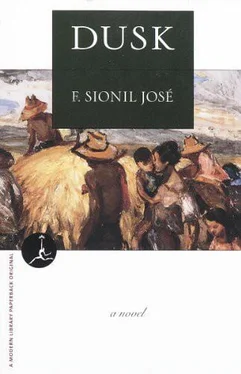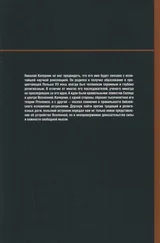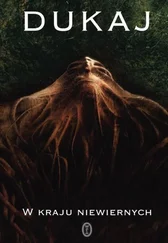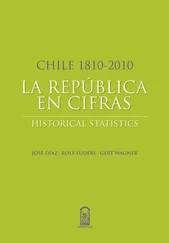Dismounting, the Spaniard took the frightened girl’s hand while the other soldiers kept guard over the caravan. He led her across the empty field stubbled with grass to where a patch of cogon sprouted. The soldiers joked and laughed and made obscene remarks; they were Ilokanos, too, but to Istak, they were no longer men but beasts; it was they who had burned Po-on, who had left him for dead. He heard himself repeating his father’s curses.
They were at the dusky rim of the jungle again. The tall razor grass was greener now and would no longer ignite as easily as it did during the height of the dry season. This portion of the road was rarely used, for in the last town most of the travelers stopped and from there they boarded the boats to the coast of Pangasinan, its towns rich with coconuts, fish, and salt.
The girl, Orang, did not want to join them anymore. She was sixteen and could read the alphabet and write her name, Leonora, that was all. All of them, they were going to learn to read and write with Istak teaching them. But now she wanted to kill herself, to drown in the first river they would cross, or to stay behind and work in any village as a servant, but not to go with them with her shame. The women — Mayang more than the rest — stayed with her through the night, soothing her, telling her it was not her doing, that no one among them could have stopped the dastardly deed.
When they started out the following morning, she was gone. She had slipped away in the night and they searched for her in the gullies, behind the mounds and the tall grass, shouting her name, their shouts echoing in the morning stillness. Orannggg … but the only answer was the sighing of the wind.
They could not leave without her.
It was An-no who found her weeping bitterly in the shade of a culibambang tree up the rise of ground where the foothills lifted. He had heard her and when he appeared, her weeping turned into a loud sobbing. He put his hand on her shoulder to comfort her. She shuddered and stiffened.
An-no rushed back to the caravan and told them she was all right, that he would bring her back. When he returned she was no longer weeping, but tears still streamed down her face and her eyes were swollen. She wore a shapeless skirt and blouse which her mother had woven.
“You must leave with us,” An-no said, kneeling before her but not touching her.
She looked away. “And you will all regard me as if I were dirty and you would not want me among you. All of you …”
“Why do you say this, Orang? Haven’t we suffered enough? Look at mc, don’t you think I feel so small because I could not help you? And if I did would I be here today? Begging you to come back? Manong Istak — he did not even raise a hand against them and they shot him. He can speak Spanish, I told you. He pleaded with them. Did they show him any mercy?”
“I cannot face anyone.”
“Look at me, Orang,” An-no told her. “Look at me or I will hold your face and force you to look at mc.”
She turned to him slowly, sorrow in her eyes.
“You are a woman now,” An-no said. “If I ask that you live with me when we reach the valley, will you do that? I will protect you and pray that no evil will happen to you again.”
“You will not take a soiled rag,” she said. “You will want something clean.”
“You are not soiled.”
“I am now.”
“Not to me. Not to me. You are pure and you are going to be my wife …”
She turned away again, but this time she was no longer crying.
They camped that night in a shallow field flanked by bald hills. Not long ago the field was planted to rice — they could see that in the strands that stubbled the land, in the broken dikes that bordered each plot. Close by, madre de cacao trees had started to bloom and there was even a sprout of banana trees without fruit. Istak wondered what had happened to the village nearby, why the people had gone. In the lead cart, he approached the hamlet, intoning loudly, ¡Bari-bari! — the ritual incantation with which an intruder sought permission to pass unknown precincts guarded perhaps by inhospitable spirits. The houses were falling apart and weeds clambered over the bamboo fences and up the walls right onto the thinning roofs. The windows were wide open, gaping at them like sightless eyes. There was nothing inside but rotting bamboo and disheveled walls with the sun streaming in. The people did not leave anything, not even a broken pot. The houses had been abandoned for more than a year and houses with no people in them die like humans.
Ba-ac did not want to sleep in the abandoned village; it smelled of disaster, of hoary gloom, and so they moved on, farther up the valley before they would ascend the mountain.
The narrow road that slit through the jungle was slippery; grass and saplings grew wild on both sides and big trees arched above them and shut off the sun, so that although it was morning it seemed as if in this face of the mountain it was early evening. There were sudden breaks of sunlight among the trees, and birds flitted through the small frame of sky. Orchids dangled from branches, some of them in bloom, bouquets of purple and white, but they were high up and only monkeys could climb after them.
One of the children walking out front screamed in horror; he had felt an itch on his calf and when he looked, there was this black abominable thing as big as his thumb, slimy and fat, and he could not remove it.
“Leeches!” Ba-ac said. He went to the child and scraped it off with his bolo. The leech was bloody and full.
Although it had not rained that afternoon, water dripped from the trees. Around their trunks, up to the lofty branches, vines coiled like huge snakes.
It would take more than a day before they would break out into the open country again and know the sun. Istak pointed out to Dalin what they could cat, the tops of ferns which could be cleaned like bamboo shoots and cooked. No one need starve in the forest, he told her.
She asked him how he came to know so much and he said he had been in the forest beyond Tirad. Padre Jose had pointed these out to him and all the other plants that could sustain life. He showed her the fruit of the rattan vine which they could cat and that she already knew. There were other wild fruits and berries — they could all be eaten.
They stopped for their meal in a white patch of sunlight, but did not tarry. They moved on. Bit-tik and An-no were now in the front and Ba-ac was in the rear immediately behind Dalin’s cart. The last cart carried their seed rice and was heavy, so no one rode in it except Ba-ac.
The big solid wheels of wood were creaking noisily, for they had not been oiled for days. It was no longer necessary — they were not going to hide anymore or travel in the night. They had passed the Guardia Civil. Ba-ac felt safer now. A few more miles, then they would break out from the low saddle of the mountain into the plains of eastern Pangasinan.
It was Dalin who first noticed it when she looked back; the cart was following them, but Ba-ac was not in the driver’s seat. Istak called for all of them to stop. He peered inside the cart but the old man was not there either.
“Tatang! Tataaang!” he shouted. The forest echoed his voice.
“Maybe,” Dalin said, “he stopped to defecate.”
“He would have told us,” Istak said. “And he would not let the cart go ahead without him.”
He retraced the trail, shouting his father’s name. Maybe Ba-ac had slipped, or had fallen asleep and toppled off the cart. But he would have awakened and called.
The forest seemed to close inexorably on Istak; he was far from the carts and could no longer see them nor could they hear him, for he had run part of the way.
Читать дальше












